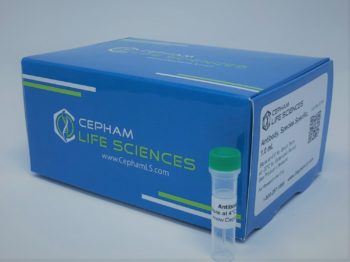Description
Aliases
ATPase H(+)-transporting lysosomal accessory protein 2, ATPase H(+)-transporting lysosomal-interacting protein 2, ER-localized type I transmembrane adaptor, Embryonic liver differentiation factor 10, N14F, Renin/prorenin receptor, Vacuolar ATP synthase membrane sector-associated protein M8-9, HT028, MSTP009, PSEC0072, ATP6IP2, CAPER, ELDF10, ATP6AP2
Antibody Type
Polyclonal Antibody
Species
Human
Uniprot ID
O75787
Immunogen
Recombinant human Renin receptor protein (1-176AA)
Raised In
Rabbit
Species Reactivity
Human
Tested Applications
ELISA;Not yet tested in other applications.
Background / Function
Functions as a renin and prorenin cellular receptor. May mediate renin-dependent cellular responses by activating ERK1 and ERK2. By increasing the catalytic efficiency of renin in AGT/angiotensinogen conversion to angiotensin I, it may also play a role in the renin-angiotensin system (RAS).
Isotype
IgG
Conjugate
FITC
Storage Buffer
Preservative: 0.03% Proclin 300
Constituents: 50% Glycerol, 0.01M PBS, PH 7.4
Form
Liquid
Storage
Shipped at 4°C. Upon delivery aliquot and store at -20°C or -80°C. Avoid repeated freeze.
Purity
Caprylic Acid Ammonium Sulfate Precipitation purified
Modification
Renin receptor
Literature
[1]”Altered splicing of ATP6AP2 causes X-linked parkinsonism with spasticity (XPDS).” Korvatska O., Strand N.S., Berndt J.D., Strovas T., Chen D.H., Leverenz J.B., Kiianitsa K., Mata I.F., Karakoc E., Greenup J.L., Bonkowski E., Chuang J., Moon R.T., Eichler E.E., Nickerson D.A., Zabetian C.P., Kraemer B.C., Bird T.D., Raskind W.H. Hum. Mol. Genet. 22:3259-3268(2013). [2]”Initial characterization of the human central proteome.” Burkard T.R., Planyavsky M., Kaupe I., Breitwieser F.P., Buerckstuemmer T., Bennett K.L., Superti-Furga G., Colinge J. BMC Syst. Biol. 5:17-17(2011) . [3]”A unique exonic splice enhancer mutation in a family with X-linked mental retardation and epilepsy points to a novel role of the renin receptor.” Ramser J., Abidi F.E., Burckle C.A., Lenski C., Toriello H., Wen G., Lubs H.A., Engert S., Stevenson R.E., Meindl A., Schwartz C.E., Nguyen G. Hum. Mol. Genet. 14:1019-1027(2005).Additional information
| Size | 50μg, 100μg |
|---|


